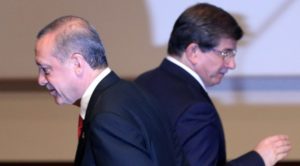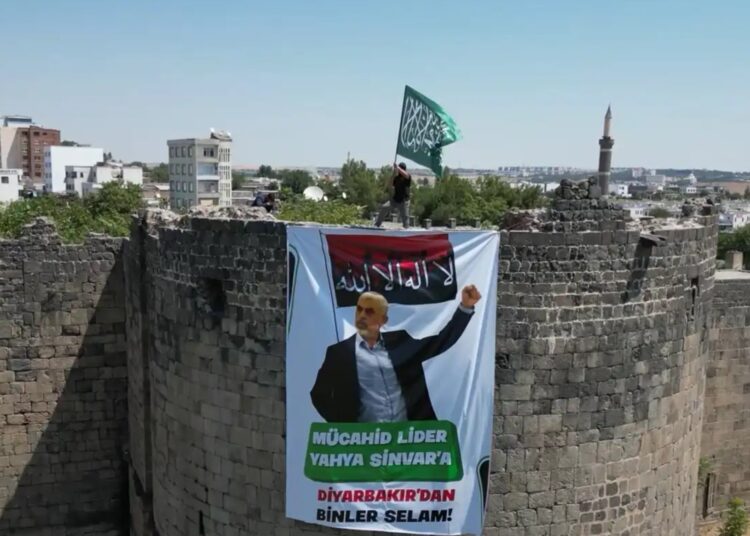Abdullah Bozkurt/Stockholm
Former Turkish foreign minister Ahmet Davutoglu revealed that Turkey was instrumental in the 2011 release of Hamas’s new leader, Yahya Sinwar, from an Israeli prison, where he was serving a life sentence, after five years of negotiations between Hamas and Israel.
In an interview with a local Turkish TV station on August 7, Davutoğlu, who now leads the small Islamist Gelecek (Future) Party, revealed that during the negotiations to free kidnapped Israeli soldier Gilad Shalit, Israel was initially reluctant to release Sinwar and 10 other Hamas members. Davutoglu, a staunch supporter of Hamas for years, said he personally led the negotiations and secured Sinwar’s release despite Israeli objections.
The agreement facilitated the release of 1,027 Palestinian prisoners in exchange for Shalit, with some of the Hamas figures subsequently settling in Turkey under the protection of the Turkish government.
“Among them were 11 individuals of particular significance. Initially, the Israeli authorities were unwilling to release them, but through Hamas’ persistent efforts, our intervention and pressure from Israeli public opinion, the exchange was achieved through our mediation in 2011,” Davutoğlu said.
Sinwar was sentenced to four consecutive life sentences for the murder of 12 Palestinians, some of whom he brutally killed when they were suspected of collaborating with Israel.

He is notoriously ruthless and violent, earning him the nickname “The Butcher of Khan Younis,” referring to the neighborhood in southern Gaza where he grew up. Israeli authorities believe he masterminded the October 7 attack last year, which resulted in the death of 1,200 Israeli civilians and military personnel and the kidnapping of 200 others.
During the negotiations between 2006 and 2011, Davutoğlu said Israel resisted demands to release Sinwar and other top Hamas figures but ultimately gave in to the pressure exerted by him and his Turkish colleagues.
It was evident that the deal would collapse if Sinwar was not included on the list of prisoners to be released. In a May interview with Jewish Insider, Emi Palmor, a member of the Israeli negotiating team at the time, said, “I wouldn’t say it was easy to release him. We knew, Shin Bet knew, that he was dangerous.” However, she conceded that there would not have been an agreement to free Shalit if Sinwar had not been part of it.
“Shalit was kidnapped by Sinwar’s brothers in order to free Sinwar,” she said. “The Palestinians gave all kinds of lists [of prisoners], and he was on all of them.”
Sinwar was not the only individual whose release from Israeli prison was secured by the Turkish foreign minister. Davutoğlu also boasted about successfully facilitating the release of seven people whom Israel sought to keep under arrest following the Mavi Marmara incident in May 2010, which involved the interception of a Turkish aid flotilla by Israeli forces, resulting in clashes that led to the death of eight Turks and one person with dual Turkish-US citizenship.
He said he exerted maximum pressure on James L. Jones, the then-US national security advisor, to ensure that Israel released the seven individuals, including Bülent Yıldırım, head of the Foundation for Human Rights and Freedoms and Humanitarian Relief (İHH), a jihadist charity organization linked to Turkish intelligence agency MIT.

The IHH is also described as a logistics supplier for global armed jihadist networks, including al-Qaeda. It has been reported to funnel aid and arms to Islamist groups in Libya and Syria with the full backing and knowledge of the government of Turkish President Recep Tayyip Erdogan.
Davutoğlu and the Islamists in his former political party, the ruling Justice and Development Party (AKP), have closely aligned themselves with Hamas and the Muslim Brotherhood. They share a similar worldview and provide political, financial and logistical support to these organizations.
Following the 2011 prisoner swap, many Hamas figures settled in Turkey, established branches and in some cases acquired Turkish citizenship. They raised funds to support operations in Gaza.
For example, Saleh al-Arouri, a deputy chairman of the Hamas Political Bureau, was among those released to Turkey. Al-Arouri conducted terrorist operations from Hamas offices in Istanbul, utilized Turkish financial and banking institutions to move funds and frequently met with Turkish officials, including Hakan Fidan, the then-head of intelligence agency MIT who is now foreign minister.
Al-Arouri was killed in an airstrike in Beirut on January 2, 2024, in an operation believed to have been carried out by Israel.
Al-Arouri’s boss, Ismail Haniyeh, also established close ties with Turkish officials, including Davutoğlu and President Erdogan, who has supported Hamas over its rival, Fatah. Haniyeh frequently visited Turkey, meeting with Erdogan and other officials, until he was assassinated in Iran on July 31, 2024. Erdogan declared a day of national mourning for Haniyeh, ordered flags to be flown at half-mast and sent his deputy to attend Haniyeh’s funeral in Qatar.
President Erdogan has described Hamas as “resistance fighters,” comparing them to the Kuvay-i Milliye (Turkey’s National Forces), an irregular militia that played a crucial role in Turkey’s War of Independence following World War I.
“I am saying it very clearly and explicitly here. During the national struggle [for independence] in Turkey, what Kuvay-i Milliye was to Turkey, Hamas is exactly the same. We are aware, of course, that there is a price to pay for saying this. We know that it’s difficult to speak the truth … during such a period. But let the whole world know this and comprehend it,” Erdogan declared on April 17.
Erdogan went so far as to threaten Israel with military action on behalf of Hamas. On July 31, during a party meeting in his hometown of Rize, he said, “Just as we entered Karabakh, just as we entered Libya, we should do the same with Israel. There is nothing stopping us. We just need to be strong to take this step.”
Turkey deployed arms, troops and officers to Libya to support pro-Turkey factions, and did the same for Azerbaijan in its conflict with Armenia in the Nagorno-Karabakh region.












